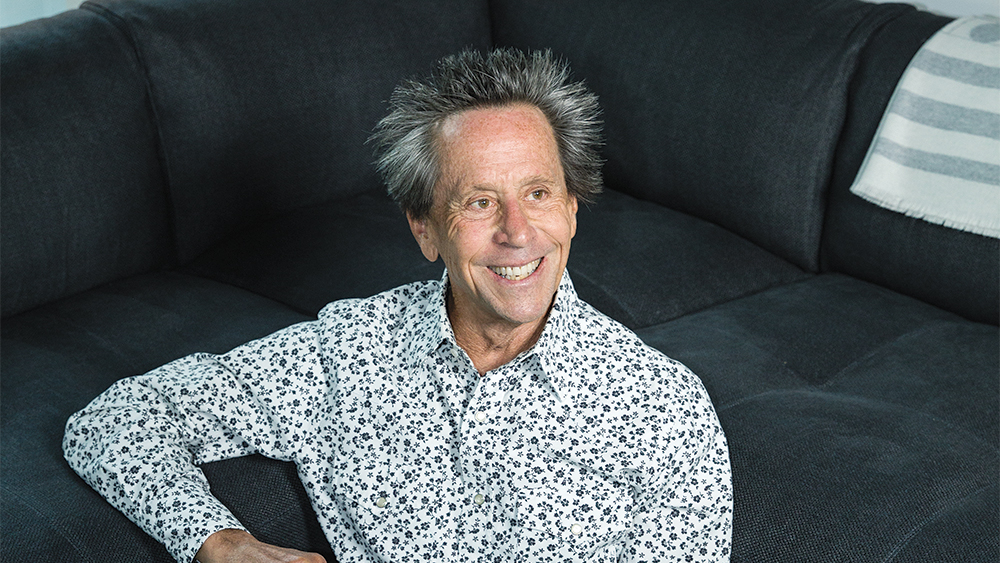A Peek Inside the Mind of the Curiosity-Driven Brian Grazer (Q&A)
By Brent Lang
LOS ANGELES (Variety.com) – On a recent summer day, the lights went out at Imagine Entertainment. A freak storm erupted, temporarily causing the power to go down. Staffers went scurrying to the windows after a thunderclap rumbled so loudly they were worried that Los Angeles was about to be roiled by an earthquake.
But Brian Grazer, the Oscar- and Emmy-winning producer of “A Beautiful Mind” and “Arrested Development” and the company’s co-founder, seemed Zen. The spiky-haired dynamo shrugged off the gray skies to welcome a Variety reporter into his Century City office. He was eager to talk about the changes upending the entertainment business — from the Time’s Up movement to corporate consolidation — and to plug his new film, “The Spy Who Dumped Me.”
Grazer, it must be said, was empowering female execs long before the current industry-wide push for gender parity. Nearly 80% of his production staff is female, and “,” written and directed by Susanna Fogel, co-produced by Imagine’s Erica Huggins and starring Kate McKinnon and Mila Kunis, is, in Grazer’s words, an “all-woman entity.” The action comedy opens Aug. 3.
But that’s not all that’s on his plate. Imagine is also developing several new TV shows, including “Swagger,” an Apple series about youth basketball that’s co-created by Golden State Warriors star Kevin Durant, and “68 Whiskey,” a dark-comedy pilot directed by Grazer’s partner in crime Ron Howard. Having written a best-seller, “A Curious Mind,” Grazer is taking up the pen once again with “Eye Contact.” The book will be out in January. It explains the role that meeting a person’s gaze has played in helping Grazer rise to the top, as well as in hosting his famous “curiosity conversations” — one-on-ones with thought leaders that have been key to helping the producer replenish the creative well.
What attracted you to “The Spy Who Dumped Me”?
It was a fun and fresh idea, particularly for two women, because women are not given those roles where they get to be funny and powerful at the same time.
Why did you decide to cast Mila Kunis and Kate McKinnon?
Mila has this unique ability to be both dramatic and funny, and she’s beautiful, but not in a threatening kind of way. Kate is this genius comedian who is so gifted in her ability to immerse herself in a character.
What was awesome about this is we had to do a table read with all the actors to see how it would play out. Mila and Kate had never worked together, so we didn’t know how their chemistry would be. Having been involved in almost 100 movies, it was the funniest table read I’ve ever seen. Most of the strong, hard humor went to Kate. But what was amazing was Mila immediately rooted for every moment that Kate scored. I’ve never seen another actor in my life have that kind of generous, loving, immediate reaction to their co-star.
Your production team is nearly entirely composed of women. Was that a conscious choice?
Femininity is very valuable in an art form. Men are often so driven by testosterone it overpowers logic sometimes, whereas women are less emotional than men and more capable of being logical. It’s the opposite of the stereotype. I found that women are less emotional on big decisions. They’re more thoughtful. Many of the men that run the studios are so busy saying, “I’ll beat that guy. I’ll kick that guy’s ass.” Why do they need to do that? The movie can win without kicking their ass. Just move it to another date. Give up on the confrontation, and think about what’s going to be a better result for the film.
Is that kind of bullying behavior going out of fashion?
Now, because of this #MeToo movement, it is. To me it’s a human rights movement. It’s a movement that’s led by women, but ultimately it’s holistic. There have been men that are really bullying, and they say lewd things, and they test you in bad ways, and it needs to stop.
You made your name with movies like “A Beautiful Mind” and “Apollo 13.” In the comic-book era, would those movies get made?
I think “Apollo 13” would, but they might make it for less. There’s empowerment involved in that film, and that’s attractive. It’s set in space, and it’s a survival story. “A Beautiful Mind” might be harder, but I think it could happen. Getting movies made is just a function of focus and will. It’s a matter of physics. If it weren’t a matter of physics, every movie would be amazing.
It can take years to get movies to a greenlight. “American Gangster,” for instance, fell apart several times before it got made. Do you mind rejection?
The fastest yes often produces the worst movie. You need some nos. Great films or TV shows need some challenges. That forces you to improve that product. The walls that the studio system puts up before you can get to a yes — usually that makes the movies better.
Disney is buying Fox; AT&T now owns Warner Bros. There’s a lot of consolidation in the studio space. Does that worry you?
I’ve been living through this for 35 years. I’ve seen all different types of consolidation, and I’ve seen all different types of hardware emerge that people think will change things to the point where it’s going to be the end of the world for content. That never happens, so that leads me to be optimistic about the future.
You’re famous for holding “curiosity conversations” with thought leaders. What are you curious about right now?
I’m curious about how everything works and how it interfaces with humanity. I’m always interested in space. I love talking to Jeff Bezos about space because he’s obsessed with it.
“Femininity is very valuable in an art form. Men are often so driven by testosterone it overpowers logic sometimes, whereas women are less emotional than men and more capable of being logical.”
Are you surprised that people are willing to meet with you for these talks?
It doesn’t come easy. To meet with Edward Teller or Jonas Salk or Isaac Asimov, I had to beg. Usually it took years of writing letters to get one person to sit down. Maybe it was because of their location or they weren’t in the mood or they fired an assistant. But I’d do anything. I’d meet people in parking lots to say I’m that guy that wants to talk. I’m very determined. That’s my profession.
You recently announced Imagine Impact, an eight-week boot camp intended to teach writers and creators the ropes of getting a film or show produced. What was the impetus for the project?
I’m very lucky. I’m in a good space in my life. For the last six and a half years I’ve been with this amazing woman, Veronica Smiley. My awesome wife has opened my mind to see things differently. She’s made me realize that there are so many gifted human beings that have unique voices or unique narratives, but they have no idea how to get into Hollywood. At the same time, we’re working in a business where there are more content platforms than ever before, but there’s less spent on development. I thought, Why not try to democratize the process, so all these voices get a chance to be heard? This gives people the tools so they know how to write a workable script, and will hopefully give them the navigational tools they need to save them years of being on the bottom rung of a very long ladder.
If you weren’t a producer, what would you be?
I probably would be in San Francisco and working on start-ups. I have a lot of ideas, and I like building things from scratch.
What’s the secret to great hair?
My daughter Sage Grazer told me how to do this at 3½ years and gave me the courage to create a polarizing event.


